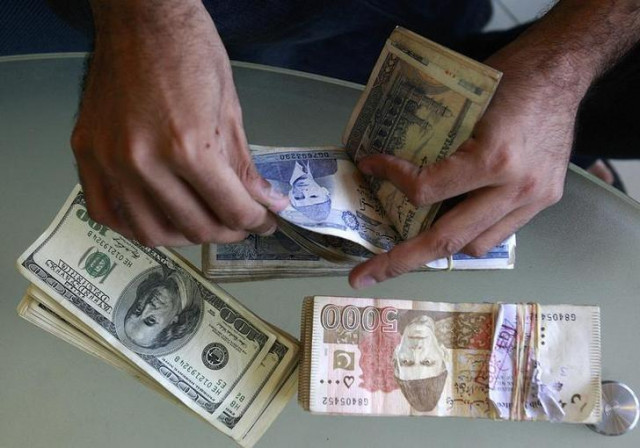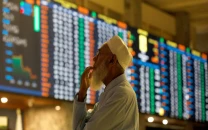PM panel urges rupee adjustment
Working group calls for linking rupee to REER, revisiting trade liberalisation

The prime minister's panel on industrialisation has recommended letting the rupee gain its true value to ensure a competitive environment for exporters and revisiting trade liberalisation to protect domestic industries. The private sector-led Working Group on Industrialisation submitted its recommendations to Prime Minister Shehbaz Sharif this week.
The panel's proposals are part of efforts to revive an economy that has stabilised but remains far from regaining momentum. According to the proposal, the value of the rupee should be linked with the Real Effective Exchange Rate, a measure of the weighted average value of the local currency compared to the inflation of trading partners. The recommendation implies that the rupee, currently traded at around Rs281 to a dollar, should be devalued by about Rs11. The REER in October was 104, indicating the rupee was overvalued by 4% or Rs11.
Prime Minister Shehbaz Sharif has constituted eight working groups to revive the economy and address issues hampering foreign investment. The task of managing these groups has been given to the Minister of State for Finance Bilal Azhar Kayani, who this week arranged the meeting of the working group on industrialisation with the PM. Leading industrialist Saqib Sherazi chaired the working group.
The group also recommended revisiting the national tariff policy, under which Pakistan has committed to cut import taxes and duties by 52% over five years. Concerns have been raised that such trade liberalisation may expose local firms to sudden foreign competition and shake the nascent external stability due to increase in imports. However, the recommendation to reverse trade liberalisation runs contrary to the International Monetary Fund (IMF) and World Bank's policy prescriptions for Pakistan.
According to an official statement, PM Sharif directed relevant ministries and departments to accelerate work on integrating private-sector proposals into a unified industrial policy framework, stressing that coordinated decision-making was essential for sustainable economic growth. The premier sought to translate expert recommendations into actionable reforms without delay and emphasised that economic growth, employment generation, and increased income were not possible without industrial development.
Last month, the minister of state for finance said the working group's tangible recommendations would be taken up with the IMF for its consent. The IMF has said implementation of the National Tariff Policy would contribute significantly to establishing a more coherent policy critical for expanding international trade, investment, and competitiveness.
The WB-IMF-agreed National Tariff Policy aims to phase out additional customs duties within four years and regulatory duties within five years. It also seeks to consolidate tariff slabs and transition exemptions to a more rules-based framework. The IMF's recent Governance and Corruption Diagnostic Assessment also stated that tariff reform under the National Tariff Policy aims to reduce para-tariffs and discretionary exemptions, as well as weaknesses in enforcement and classification.
The working group has also recommended linking the State Bank of Pakistan's key policy rate with the inflation rate, a prescription that would require a significant cut from the current 11% rate maintained by the central bank, which industry says is detrimental to growth. In its governance report, the IMF said banks in Pakistan have earned steady returns mainly through investments in treasury bills, while lending to the broader economy remains limited.
The treasury bill rate hovered above 20% in the first half of 2024 but had declined to around 12% by end-March 2025. Credit to the government makes up more than 60% of bank assets, while credit to the private sector is very low compared to Pakistan's peers. Banks earn a return on equity above 25%; the majority are well-capitalised and liquid.
The working group has also recommended cutting industrial sector taxes by 30% to improve competitiveness and ensure earnings are not substantially eroded by government levies. After adding all types of taxes, including dividend taxes, the corporate sector's tax rate jumps to over 60%, compared to the headline income tax rate of 29%.
Another key recommendation is the establishment of a National Industrial Commission to provide a permanent platform for addressing issues faced by the industrial sector. The commission would serve as a key institution for governmentprivate sector partnership.
The official handout stated that PM Sharif welcomed the recommendations and said private-sector proposals were of key importance for industrial development. "The business community has diligently prepared comprehensive proposals for industrial development, which are commendable," said the PM.
He directed that, after careful review, an implementation plan would be formulated. PM Sharif also instructed that these recommendations be merged with proposals from other economic sectors and incorporated into the national policy framework.
Members of the industrial working group included Abbas Akberali of Amreli Steels, Ahsan Zafar Syed of Engro Corporation, Mohamed Ali R. Habib of Indus Motor Company, Nauman Wazir Khattak of FF Steel, Muhammad Kamran Kamal of Hub Power Company, and Osman Saifullah of Saif Group.





















COMMENTS (2)
Comments are moderated and generally will be posted if they are on-topic and not abusive.
For more information, please see our Comments FAQ